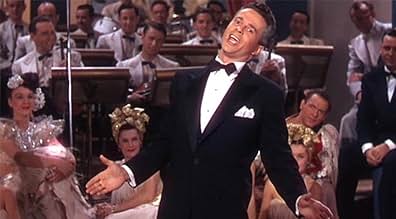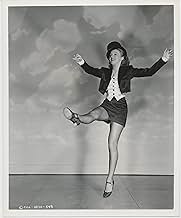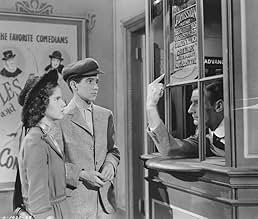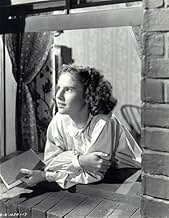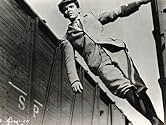Ajouter une intrigue dans votre langueThis movie shows the idealized career of the singer Al Jolson, a little Jewish boy who goes against the will of his father in order to be in showbiz. He becomes a star, falls in love with a ... Tout lireThis movie shows the idealized career of the singer Al Jolson, a little Jewish boy who goes against the will of his father in order to be in showbiz. He becomes a star, falls in love with a non-Jewish dancer, and marries her. In the end he chooses success on the stage.This movie shows the idealized career of the singer Al Jolson, a little Jewish boy who goes against the will of his father in order to be in showbiz. He becomes a star, falls in love with a non-Jewish dancer, and marries her. In the end he chooses success on the stage.
- Réalisation
- Scénario
- Casting principal
- Récompensé par 2 Oscars
- 5 victoires et 5 nominations au total
- Church Choir
- (as Mitchell 'Boychoir')
- Audience Member
- (non crédité)
- Dancer
- (non crédité)
- Wardrobe Woman
- (non crédité)
- Audience Member
- (non crédité)
- Audience Member
- (non crédité)
- Audience Member
- (non crédité)
Avis à la une
My father had me watch this movie as a kid on Million Dollar Movie and I was taken by the personality, drive, energy, and talent of this great entertainer. Hearing about, and seeing, silent movies made me all the more in awe of the talent Jolson must have been since Hollywood banked it's future on talkies with "The Jazz Singer".
Besides Parks excellent performances are also put in by William Demerest, who many of us remember as Uncle Charlie in My Three Sons, Evelyn Keyes as Julie Benson (Jolson's first wife) and the rest of the cast. The 1949 making of Jolson Sings Again is also worthwhile, if for no other reason than watching Parks do the masterful lip-sync and the incredible vocals of Jolson.
The film has an absorbing storyline even though it is not entirely accurate and it does take some liberties with the facts. Jolson's mother died when he was eight years old yet in the film she lives on to see him become a big success on Broadway. Many people who played active parts in Jolson's real life story did not even get a mention in the film version. His long time manager Louis Epstein, his dresser/valet Frank Holmes and his brother Harry were all eliminated from the plot! The character Steve Martin played by William Demarest did not actually exist and it has been suggested that this role was probably a composite of the three men referred to above plus several other people. Jolson's first two wives were not even mentioned and Ruby Keeler (Jolson's third wife) would not allow her name to be used in the picture so ravishing Evelyn Keyes had to play the fictitious Julie Benson instead. Ziegfeld: "This is Julie Benson - the star of my next production "Show Girl"." Jolson: "Mr Ziegfeld you will please not advertise on my time!".
Harry Cohn (the notorious head of Columbia Pictures) is to be congratulated for going ahead with this film when all the other major studios had turned it down. Even Warner Bros. (for whom Jolson had starred in several films) were not interested. Filming was started on a small budget and in black and white. However, when Harry Cohn saw the early rushes he decided to film in colour and make "The Jolson Story" a major prestigious production. This certainly paid off for him in a big way as the film became one of Columbia Pictures top money earners. Jolson desperately wanted to play the leading role himself and was opposed to another actor portraying his life. Unfortunately at that stage in his career he was obviously too old (he was 60) but the studio could not have found anyone better than the young Larry Parks (31) who perfectly captured the Jolson style and threw himself into the part with relish. However, Jolson did manage to play himself in one scene singing "Swanee" on the Winter Garden runway (all filmed in longshot with no close-ups). When I saw "The Jolson Story" for the first time it had a major impact on my life and for weeks afterwards I was quoting lines from the film that had stuck in my mind such as these from Jolson to Julie Benson: "Broadway, ha, what a street, you know something baby - it belongs to me. You know something else, if you want it, I'll give it to you!"
The musical numbers were absolutely magnificent and with popular songs like "California Here I Come", "You Made Me Love You", "Toot Toot Tootsie", "April Showers", "Robert E. Lee", "Liza", "Mammy", "Liza", "About a Quarter to Nine", "I'm Sitting on Top of the World" and "Rockabye Your Baby" how could it miss! If there is one film I could take to a desert island it would have to be "The Jolson Story" as I never tire of seeing repeated showings of this timeless classic. As Jolson himself would have said: "Settle back folks, you ain't heard nothin' yet!" (and he would be right about that). 10/10. Clive Roberts.
Le saviez-vous
- GaffesLe chanteur de jazz (1927) had its world premiere at the Warner Theatre in New York, not the Winter Garden as depicted in the film (as "The Jolson Story" was a Columbia picture, the change is understandable).
- ConnexionsFeatured in The Soundman (1950)
- Bandes originalesLet Me Sing and I'm Happy
(uncredited)
Written by Irving Berlin
Sung by Al Jolson over opening credits
Originally from Mammy (1930)
Meilleurs choix
- How long is The Jolson Story?Alimenté par Alexa
Détails
Box-office
- Budget
- 2 800 000 $US (estimé)
- Durée2 heures 8 minutes
- Rapport de forme
- 1.37 : 1
Contribuer à cette page


